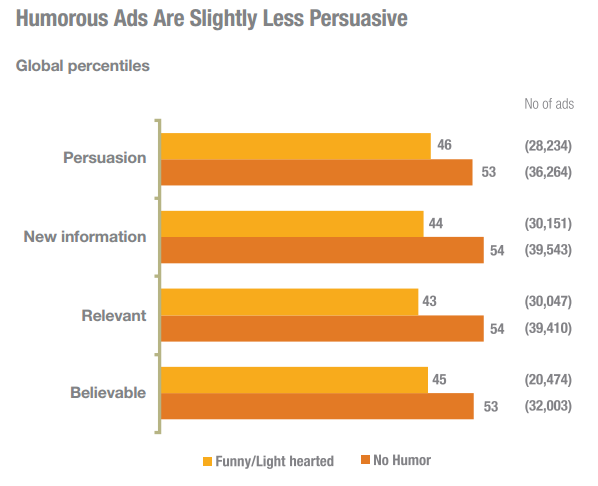Millward Brown thoroughly analysed humour used in advertising, pulling the concept apart and looking at it from every angle imaginable. Their first conclusion makes sense: Humour is a common element in advertising. About half of all ads around the globe are considered either “funny” or “light-hearted.”
This is not a really surprising figure. Companies know that humour in advertising can make an ad more memorable. If an ad is remembered, it's often considered effective. 'Effective' is a pretty weird term though. When is a commercial effective? If a lot of people like it? If people buy the product? And if people buy the product, is that directly caused by the commercial? Because of this, Millward Brown invented the 'Awareness Index'. This measures memorability of an ad and relates it to sales effectiveness. Knowing this, let's move on:
The above graphs shows a strong relationship between humour and impact. These are related because humour can drive involvement, which drives memorability. On a global basis, ads with humour score almost twice as high on involvement as ads without humor.
But it can't all be fun and games, right? This isn't a golden formula. Just taking a boring product, have someone write jokes about it (preferably puns), isn't enough. There are downsides, otherwise the rate of companies who use humorous advertisements would be 100%. Humour that is not related to an ads' key message may be so distracting that the key message is missed. Missed humour is the worst case scenario. Millward Brown gives an example in their report.
"For example, one ad we tested was working well in many
aspects, but it used a joke that was just not funny. Viewers
described the ad as boring and irritating, and enjoyment
was below average. We advised the client to keep the
description of the brand’s benefits unchanged while using
more original humor. With stronger humor, the enjoyment
rating improved, and so did the message communication."
Ads being unfunny or not being understood is the main reason companies choose to not include humour. it's hard to say beforehand whether a certain ad will be successful. Humour is subjective and often culturally specific. Certain types of humour don’t travel well, like mockery, parodies and dark humour, as well as humour that depends on subtleties. In addition, there are some specific country issues. In China, sarcasm is not widely appreciated. In Singapore, humor based on sexuality is taboo. The English love irony, while images found sexy in most of Europe may be considered sexist by British women.
This ended on a bit of a downer. So, in view of all this, is it possible for humour to work across markets? Millward Brown found it that it can, but it has some guidelines:
• The subject matter has to be universal
• The references used have to be universally understood (e.g. young romance, new baby)
• The subject should not be offensive or taboo
• The humour has to be visually based, rather than relying on something that may be lost in translation
Next week, we'll look at another researched view on the use of humour in advertising.
Source



No comments:
Post a Comment